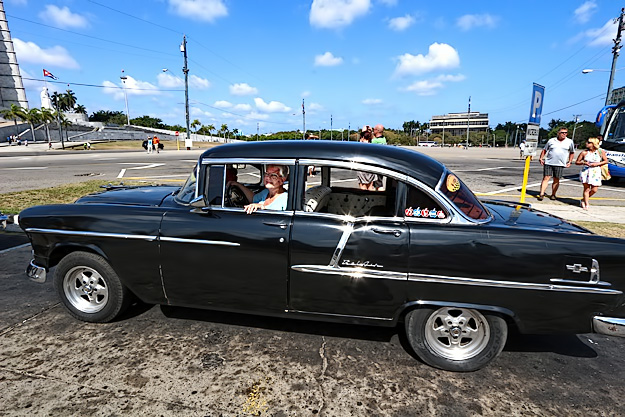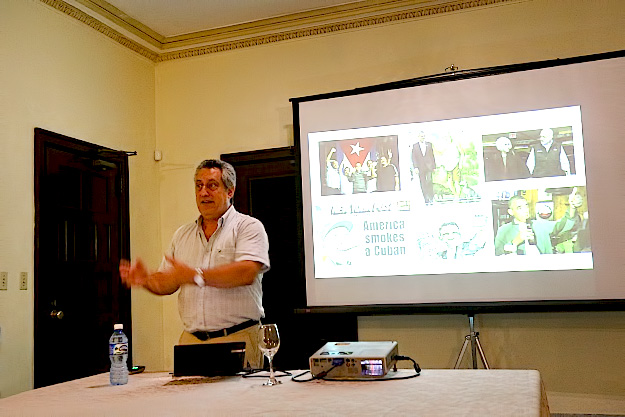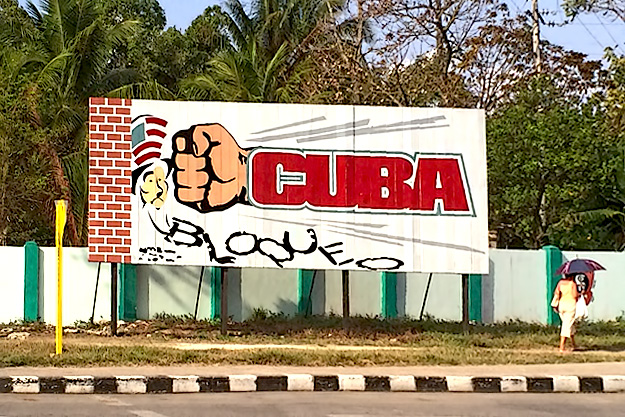We’d barely stepped off the plane when I had my first conversation with a Cuban. At Revolution Square, I hurried over to the line of classic car taxis awaiting passengers and began chatting with the owner of a shiny black 1955 Chevy Bel Air. His eyes bugged out when he learned I was from the United States.
“Americanos pueden viajar a Cuba ahora?” he asked incredulously. I explained that travel was still restricted, but that I had come with Discover Corps, a company that offers people-to-people tours approved by the U.S. government. I added that, due to the warming relationship between the U.S. and the Cuban governments, I was sure that travel to Cuba for all Americans would soon be possible.
“I hope so,” he replied, switching to English for my benefit. “We want you. We NEED you!” I turned to snap a photo of his classic car and he stopped me. “No, no, no…you must sit inside and let me take a photo of you.”

Discover Corps granted me access that the normal traveler to Cuba would not have. In addition to introducing us to local artists, musicians, dance troupes, and the emerging class of Cuban entrepreneurs, evening walks along the malecon in Havana allowed direct contact with residents, who were eager to speak to us about life in Cuba and how things are changing. Certainly, Cubans are eager for the U.S. to lift the travel ban on Cuba. They want the one million American tourists that are projected to flood into the country each year. But whether or not they need America was addressed in depth on the day we met with Jorge Mario Sanchez, an economics professor from the University of Havana. Sanchez explained some of the far-reaching consequences of the American embargo on Cuba and insisted that, “We do not need to trade with the United States, but we do need the U.S. to stop interfering with Cuban trade.”
Sanchez was referring to Proclamation 3447, signed by President John F. Kennedy on February 7, 1962, which made “the importation into the United States of all goods of Cuban origin and all goods imported from or through Cuba” illegal. Those regulations were further modified in 1981, when then President Ronald Reagan gave orders to tighten the Cuban embargo. According to Timothy C Brown, PhD., to whom the job of complying with the President’s order fell, the U.S. had “already emptied its quiver of bilateral measures.” In his book, Diplomarine: Terrorism, Turf Wars, Cocktail Parties and Other Painful Joys My First Thirty Years of Foreign Affairs, Brown says, “…one afternoon an idea popped into my head. If there weren’t more ways we could screw the Cubans directly, why not screw them indirectly via our friends who were still trading with them, which pretty much included everyone.”

Brown learned that Cuba’s main exports were sugar, nickel, cigars, tobacco, and AK47s, and immediately went about “screwing” America’s major trading partners. Canada and Poland were both buying sugar from Cuba, for use in the production of Canadian Club whiskey and Polish hams. The U.S. informed both countries that the importation of these products would be stopped if they contained any Cuban sugar. At one point, Brown even suggested that the distillers “put radioactive isotopes in whatever Cuban sugar they bought so we could trace it, just in case.”
Nickel was even easier. National metallurgical labs informed Brown that, using a process known as gas chromatography, they could detect even traces of Cuban nickel in products being imported into the U.S. Brown wasted no time informing an officer from the Japanese Embassy that heretofore, the importation of automobiles, computer parts, electronic devices, and any other products containing stainless steel or chrome, and which contained even a trace of Cuban nickel, would be prohibited.
The U.S. subsequently entered into secret certification arrangements with France and Italy to assure that Cuban nickel imported by those countries did not enter the United States. A Spanish-owned semiconductor manufacturer in Cuba that was using American patents and secretly shipping American-made manufacturing equipment to Cuba was named an Enemy Agent under the Trading with the Enemy Act. As expected, the price of Cuban nickel dropped. With trading partners falling like flies, Cuba became even more dependent on the Soviet Union, one of their few remaining trading partners.

Cuba’s economy floated along until the breakup of the Soviet Union in 1989. By the following year, officials had been informed that Russia could no longer subsidize Cuba. Embassy personnel were recalled and the flow of goods into Cuba from Russia and former Eastern Bloc countries, including petroleum, all but disappeared. Construction projects ceased and factories across the country were closed, eliminating millions of jobs. With no access to gasoline, transportation and agriculture broke down, resulting in severe food shortages. Food rationing provided only one-fifth of the daily recommended caloric intake; as a result the average Cuban lost 20 pounds. Cattle herds across the nation disappeared and special legislation was passed, making it a crime to kill and eat a cow. Even animals in the zoo and cats on the streets disappeared, making their way to dinner tables. Our guide, Dayron, a boy of 14 in 1990, has vivid memories of people starving and scavenging for food during the bleakest years.
Yet this ‘Special Period in Time of Peace,’ as it is known in Cuba, had a few unexpected positive effects. Gradually, fossil-fuel dependent crops such as sugar cane were converted to more environmentally friendly crops such as fruit orchards. As people turned to diets rich in fiber and fresh produce, deaths from diabetes and coronary heart disease declined. With the scarcity of petroleum-based pesticides and fertilizers, Cubans turned to organic and urban farming, clearing lots where old houses had crumbled and converting them to agricultural use. Gardens sprang up on rooftops, patios, and empty parking lots. Neighborhood farmers markets took hold.
Despite the hardships, Cubans seem to hold no grudge; like other parts of the world where the the United States is seen in a negative light, Cubans easily draw a distinction between American citizens and the policies of the U.S. government. In conversation after conversation, Cubans expressed their admiration for President Obama, their love for Americans, and their hopes that the embargo will soon be a thing of the past.
Disclosure: I was a guest of Discover Corps during my stay in Cuba. However, the receipt and acceptance of complimentary items or services will never influence the content, topics, or posts in this blog. I write the truth, the whole truth, and nothing but the truth. Discover Corps was able to provide access to experts and exposure to information that I never would have found on my own, and I can’t speak highly enough about their tour.

Enlightening. Thank you for sharing.
You’re very welcome, Dr. Sa.